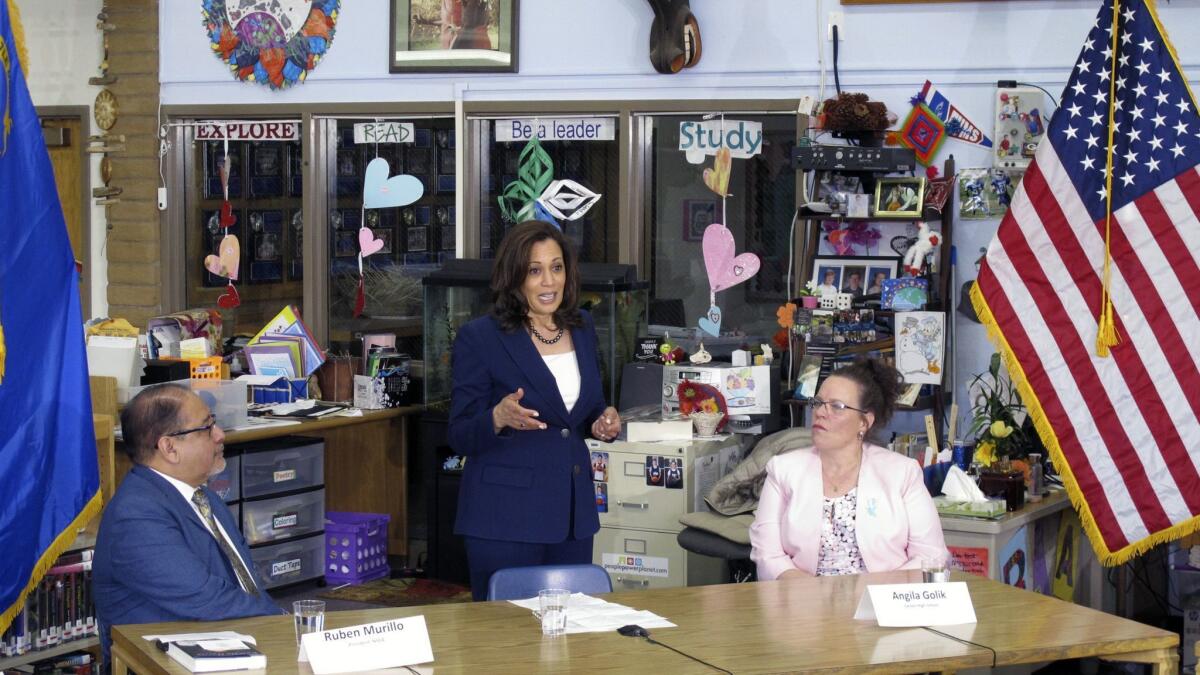Op-Ed: Give teachers more money. The raises will pay for themselves

- Share via
Democratic presidential contender Sen. Kamala Harris of California wants to increase teachers’ pay nationwide to the level enjoyed by other college-educated workers — and her proposal would give a typical educator a $13,500 raise. She suggests covering the $30-billion-a-year price tag by increasing the estate tax and closing some loopholes benefiting the top 1% of taxpayers.
She may need that tax plan for political reasons. But in fact, a teacher pay raise will pay for itself. No — actually, raising teacher pay will likely make money for the government.
It’s not just striking and protesting teachers who insist that they are underpaid. Across the political spectrum, researchers agree that teachers earn lower salaries than workers with similar educational backgrounds. The Economic Policy Institute calls the discrepancy a “teacher pay penalty,” and pegs it at over 18%, noting that even with more generous public employee benefits, the total compensation gap is still 11% — a record high. Eric Hanushek, of the Hoover Institution, and two colleagues estimate the teacher salary gap to be 22%.
Better teachers impart more knowledge. Students who learn more earn more.
Not coincidentally, the United States is no longer attracting a critical mass of teachers from among the top tier of college graduates. Researchers report that just 23% of American teachers graduated in the top third of their college class. In Singapore, Finland and Korea — which have the world’s leading schools — essentially all teachers are drawn from the top third of graduates. Looking across the world, we also see that students perform better when they have smarter teachers and in countries where their teachers are well paid compared with other college graduates.
Better teachers impart more knowledge. Students who learn more earn more. People who earn more pay more taxes — and in this case, more than enough to cover higher teacher salaries.
It’s well established that an extra year of student learning raises lifetime earnings by about 10%. We can also work out roughly how much more students would learn from better paid teachers. A Columbia University study looking across states finds that a raise of the size Harris proposes would have a measurable impact: On average, graduating students would have gained the equivalent of an extra 30% of a school year. International comparisons of teacher salaries and student performance suggest an effect three times that size.
Even if we take the lower figure, that would create a 3% increase in overall earnings. Labor income in the United States is about $13.3 trillion, so 3% of that is $400 billion dollars a year.
Americans pay an average federal income tax of 14% (leaving out sales and other taxes), so these increased wages would produce $56 billion in annual tax revenue — almost twice the cost of Harris’ program. That not only pays for the teacher raises, it leaves plenty of spare change.
Enter the Fray: First takes on the news of the minute from L.A. Times Opinion »
Of course, this is subject to argument. There are three reasons my suggested return-on-investment might be too high. The first: even if we raised teacher salaries tomorrow, it will be several years before enough top-tier graduates are persuaded to get jobs as teachers. So the educational improvements will happen only gradually. The second delay factor is that it takes time for the now better-educated students to reach the labor force. Finally, the spending starts now and the returns come down the line, so one needs to account for the time value of money.
All three of these factors lower the rate of return, but they don’t alter the conclusion that, in a business-decision sense, higher teacher salaries pay for themselves.
On the other hand, my projected returns could be too low. There are scientific estimates that better education greatly increases long-run economic growth. Total tax receipts in the United States are 27% of our gross domestic product, not just the 14% taken in income tax. By that measure, the return on higher teacher salaries might be twice as big, or over $100 billion a year.
Most policy discussions center on whether the benefit to society is worth the cost in taxes, as well as who benefits and who pays. But sometimes a government investment has such a high return that it pays for itself. Raising salaries for teacher is one such proposal.
Dick Startz is an economics professor at UC Santa Barbara and author of “Profit of Education.”
Follow the Opinion section on Twitter @latimesopinion and Facebook
More to Read
A cure for the common opinion
Get thought-provoking perspectives with our weekly newsletter.
You may occasionally receive promotional content from the Los Angeles Times.









